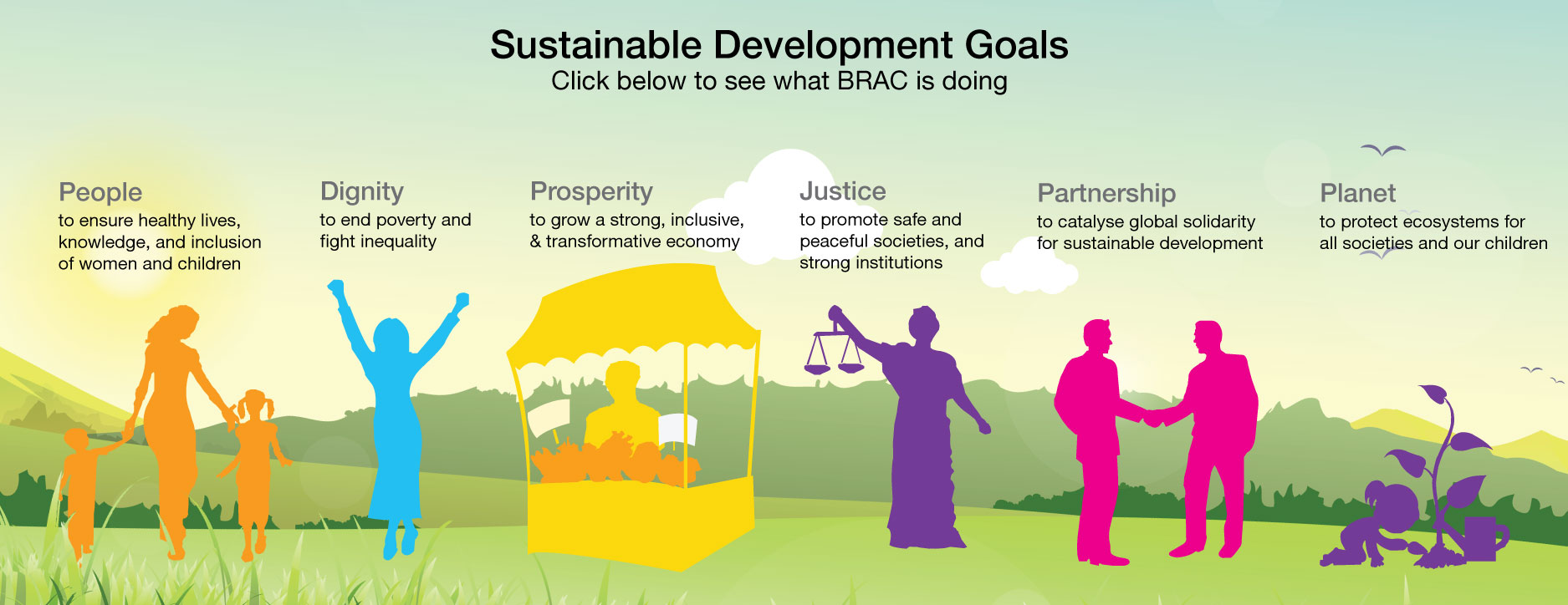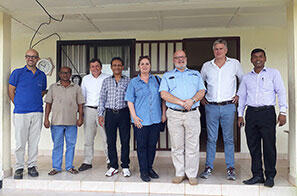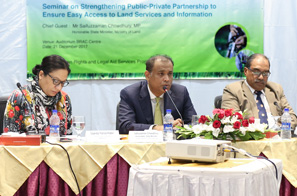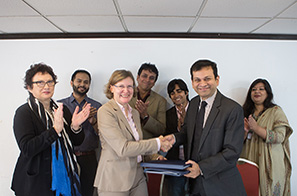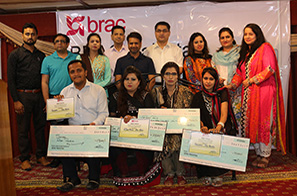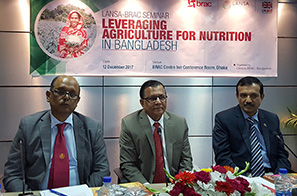
English (963)
Children categories
Privacy Policy
Respecting Your Privacy
This Website is owned and operated by BRAC. We recognise that visitors to our site may be concerned about the information they provide to us and how we treat that information. This Privacy Policy addresses those concerns. This policy may be changed or updated from time to time. If you have any questions about our Privacy Policy, you can contact us at:
BRAC Centre
75 Mohakhali,
Dhaka-1212
Bangladesh
Tel: 88 02 2222 81265.
Ext: 3107, 3155, 3158, 3161
Fax: 88 02 2222 63542
E-mail: This email address is being protected from spambots. You need JavaScript enabled to view it.
BRAC uses its best efforts to respect the privacy of its online visitors. At our site, we do not collect personally identifiable information from individuals unless they provide it to us voluntarily and knowingly. This means we do not require you to register or provide information to us in order to view our site. BRAC only gathers personally identifiable data, such as names, addresses, zip/postal codes, e-mail addresses, etc., when voluntarily submitted by a visitor. For example, personally identifiable information may be collected in order for a visitor to make a donation online. This information is used solely by BRAC or other entities who are involved in the operation of this site for internal purposes. BRAC's lists are never sold to third parties. We will only share personally identifiable information with third parties when the person submitting the information authorises us to share it or we are required to by law. As with most other Internet sites, our Web server automatically recognises the domain name of each visitor to the site, but not the e-mail address (where possible). This IP address tells us which domain you visited from (e.g. aol.com). We use the information we record to help diagnose problems with our server and to improve the content of our Web page. The information is not shared with other organisations for commercial purposes.
Opt-Out
If you supply us with your postal address or e-mail address online you may receive periodic mailings from us with information on our programmes and services.
If you do not want to receive postal mail or e-mail from us in the future, please let us know by sending an e-mail to This email address is being protected from spambots. You need JavaScript enabled to view it. or writing to us at the above address telling us that you do not want to receive postal mail or e-mail from us. Some mailings are prepared well in advance, so please allow up to three months for your request to be properly reflected on our mailing lists.
Is Credit Card Information Secure?
We care about the safety and security of your transaction. We use high grade encryption and the https security protocol to communicate with your browser software. This method is the industry standard security protocol, which makes it extremely difficult for anyone else to intercept the credit card information you send to us.
How Do We Use "Cookies"?
Visitors should be aware that non-personal information and data may be automatically collected by BRAC’s Website through the use of "cookies." "Cookies" are small text files a Website can use to recognise repeat visitors, facilitate the visitor’s ongoing access to and use of the site, and allow a site to track usage behavior and compile aggregate data that will allow content improvements. Cookies are not programmes that come onto a visitor’s system and damage files. Generally, cookies work by assigning a unique number to the visitor that has no meaning outside the assigning site. If a visitor does not want information collected through the use of cookies, there is a simple procedure in most browsers that allows the visitor to deny or accept the cookie feature. BRAC uses "cookie" technology only to obtain non-personal information from its online visitors in order to improve visitors’ online experience and facilitate their visit within our site.
External Links
This site contains links to other sites. Unless we expressly state otherwise, BRAC makes no representations whatsoever concerning the content of those sites. The fact that BRAC has provided a link to a site is not an endorsement, authorisation, sponsorship, or affiliation with respect to such site, its owners, or its providers. There are risks associated with using any information, software, or products found on the Internet, and BRAC cautions you to make sure that you understand these risks before retrieving, using, relying upon, or purchasing anything via the Internet.
Note to Parents and Children
BRAC welcomes children to learn more about our organisation and about the issues presented on the BRAC sites, and we are particularly respectful of the privacy of our young users. We encourage parents to monitor their children's use of the Internet and to help us protect their privacy by instructing them never to provide personal information on this site or any other without permission. We will never attempt to extract unnecessary information from our users, regardless of age. Consistent with the Children's Online Privacy Protection Act of 1998 ("COPPA"), we will never knowingly request personally identifiable information from anyone under the age of 13 without prior verifiable parental consent. If we become aware that a child under 13 has provided us with such information without consent, we will use our best efforts to remove such information from our files. If a parent or guardian becomes aware that a child under 13 has provided such information to us, he or she should contact us at This email address is being protected from spambots. You need JavaScript enabled to view it..
Updating Your Information
We work to process and maintain accurately the information that you share with us. If you have donated to us and would like to correct or update your personal data or to adjust your mail preferences, you can do so by emailing us at This email address is being protected from spambots. You need JavaScript enabled to view it., calling us at 88 02 2222 81265, or by sending us the update via postal mail sent to,
BRAC Centre
75 Mohakhali
Dhaka - 1212
Bangladesh.
Photo Copyrights
Photo copyright: BRAC/Shehzad Noorani/Jake Lyell/Saiful Huq Omi
Changes to this Privacy Policy
We may, from time to time, make changes to our Privacy Policy, based on your comments and our need to reflect accurately our data collection and disclosure practices. If we make any substantial changes in the way we use your personal information, we will notify you by posting an announcement on our website.
This Privacy Policy was last updated on October 24, 2021. BRAC® and BRAC® and other marks used on this website are trademarks of BRAC or its affiliates and may not be used without permission.
NGOs in national development: Will it be relevant in the coming days?
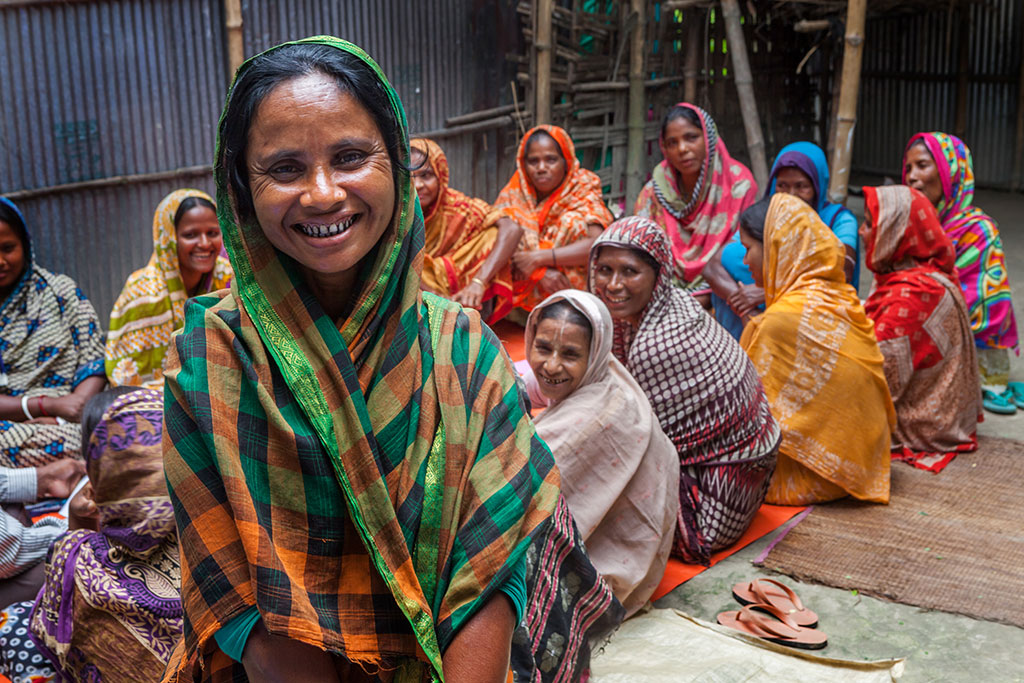
1
When the World Bank declared Bangladesh as a lower-middle income economy in 2015, some of us can remember its first president in Bangladesh Just Faaland and his joint work with economist Richard Parkinson. The duo saw what a difficult path awaited the new nation in The Test Case for Development (1976):
'It must be the fond hope of most educated people that man can control events and his own future. There is little to give credence to that view in the situation of Bangladesh … Nature, not man, is in charge of the situation in Bangladesh … All of this would not matter if Bangladesh were rich in natural resources and under-populated, if it were effectively governed, and if its social order and economic system were geared to growth, but none of these things obtain.'
Four decades after the publication, the World Bank once again discussed Bangladesh, this time for its success in alleviating extreme poverty. In recognition of the success, its president Jim Yong Kim was present in Dhaka for the UN International Day for the Eradication of Poverty on 17 October. He observed, ‘Bangladesh has shown the world that a long list of hardships can be overcome… its people have shown that innovation, commitment, setting goals and visionary leadership can accomplish feats that few dared to imagine.’
The chief of the same global body celebrated a change that, forty years earlier, was unimaginable to his predecessor.
2
As Faaland-Parkinson rightly observed, Bangladesh did not have the adequate base of large-scale industrial and agricultural production or mineral resources of high value for taking the mainstream path to development. The nation therefore cut its own unique path, which closely tied social development with economic progress. Income generation for poor households through small initiatives, earning opportunities for families living in extreme poverty, huge migration from low-income groups for wage labour abroad, increasing the involvement of women in income-generation activities, increased disaster preparedness, around hundred per cent children enrolled into primary schools, reducing the size of the average family, a number of outstanding successes in health - including eradication of polio and smallpox, prevention of night blindness, controlling diseases like tuberculosis and diarrhoea – all these apparently smaller and unremarkable successes and achievements brought a sustained change in the life of millions of people living in poverty. The combined impact of the changes is reflected in national progress indicators, as well as in fulfilling the country’s MDG target of bringing poverty rate down to 29 per cent three years before the target.
The innovations and initiatives of normal citizens have played the most significant role in these changes. The government’s long-term policies and their fairly consistent spending in areas such as education and health have provided support, and not-for-profit social and development actors and the private sector have also played a big role. NGOs particularly played a crucial role of bringing innovation into rural poverty reduction, and in establishing platforms through which people living in poverty, particularly women, can access basic services and exercise rights.
3
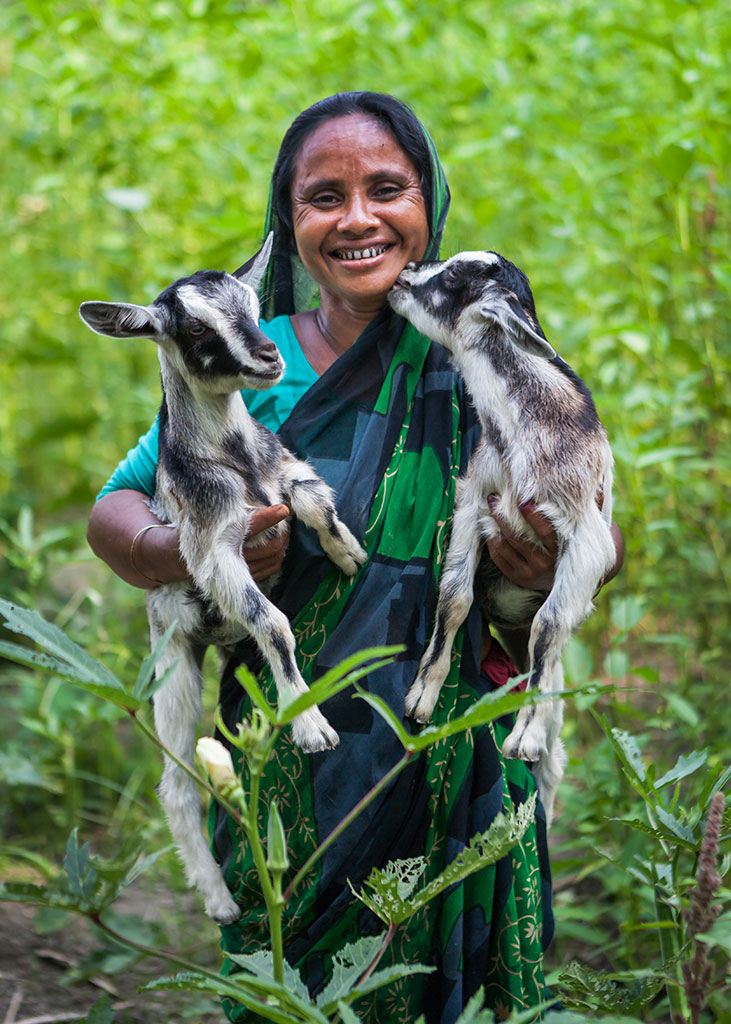
Having reached this juncture, where Bangladesh is poised to make an even greater leap towards economic prosperity, some have argued whether NGOs have anything more to do in this country. The reality is NGOs are no less important in current Bangladesh than they were any time in the past. The USA, with all its prosperity, has more than 1.5 million active not-for-profits. With socio-economic changes, the nature of social problems will change shape. The key challenges we see now in Bangladesh are rapid urbanisation, quality education for the 21st century, climate change, youth employment, increasing inequality, huge lifestyle changes and their psychological consequences. The impact of these factors will only intensify in the coming years, and the nation will need to be adequately prepared to tackle them. Not-for-profit social organisations will play a big role in tackling them.
Financing has always remained one of the biggest challenges for NGOs. A large portion of NGOs draw their finance from international donors. Bangladesh’s preferred status as a darling country of choice by donors is changing with her steady progress though. In parallel, new crisis pockets which increasingly demand humanitarian relief are emerging globally. Donor assistance is now often directed to communities struggling with more dire situations such as war and famine. How can then Bangladeshi NGOs finance its activities with such dire constraints? Two major way-outs in this regard are:
- Encouraging growth of social enterprises
- Drawing from government resources
BRAC's social enterprises have proved that intelligently-developed commodities and services can play a strong role in social good. Aarong, BRAC’s flagship social enterprise initiative, not only involves 65,000 artisans across the country, but its training centres have also provided a platform for thousands of skilled people to become independent entrepreneurs for the last four decades. Aarong’s profits are partly channelled for the growth of the enterprise and partly support BRAC’s other social development initiatives.
The basic concept behind social enterprises such as Aarong is to develop and sell high-quality commodities and services for the richer segments in society, and then spend the surplus on social development causes. NGOs facing a curb in donor funding will need to explore areas where market gaps exist and private sector players are reluctant to get on board because there are not enough profits.
4
Our government needs to bring NGOs as part of their Annual Development Plan implementation activities and for good reasons. The government's present target is to achieve the status of an upper-middle income country by 2030-31. This will require the per capita income to rise to an ambitious USD 4136. This target has to be combined with the Sustainable Development Goals to ensure equity-based progress. The government has planned the process out in the current seventh 5-year plan. Many challenges make this a tough target to achieve however -- the major ones being reduced donor assistance, bureaucratic hurdles, delayed implementation of projects and a lack of innovative models for solving social problems. Utilising NGOs' capacity of innovation, programme implementation and grassroots mobilisation can be an important tool for the government in ensuring equity-based development.
There are already ample examples of GO-NGO partnerships in our country. The government's partnership with the ICDDR,B and BRAC to spread the oral saline formula to the grassroots is probably the best-known of these. In a more recent example, 23 NGOs are working in a government-led partnership to rid the country of TB.
These GO-NGO partnerships are happening only in the donor funded projects though. It is time to involve the social development organisations in the national revenue funded programmes also.
It is also important to note that NGOs are never an opponent of the government. NGOs, particularly the service-focused ones, are merely a sector that works through the policies and laws and under the guidance of the state in a complementary capacity. Social organisations are able do things quickly, because of the nature of the organisational culture, which the government sometimes finds difficult because of its structure and capacity. On the other hand, most NGOs do not have the capacity of working at a scale as large as that of the government.
It is the centuries-old tradition of working for the common good with a voluntary spirit that lies at the heart of forming NGOs or any other social organisations. Their necessity does not end with whatever great progress a nation or society achieves. The hundreds of NGOs that have been serving Bangladesh's people for decades are expected to continually adapt to the changing realities and needs. The government should also come forward to become part of the solution and embrace them to increase the effectiveness of both parties.
As one of the country's major development actors, our demand is equity-based growth for our country. To avoid the risk of Bangladesh’s economic growth creating massive inequity, NGOs will continue to be relevant. The question is whether we are willing to evolve and are ready to do such partnerships.
BRAC signs agreement with Danish govt to facilitate reintegration of returnee migrant workers
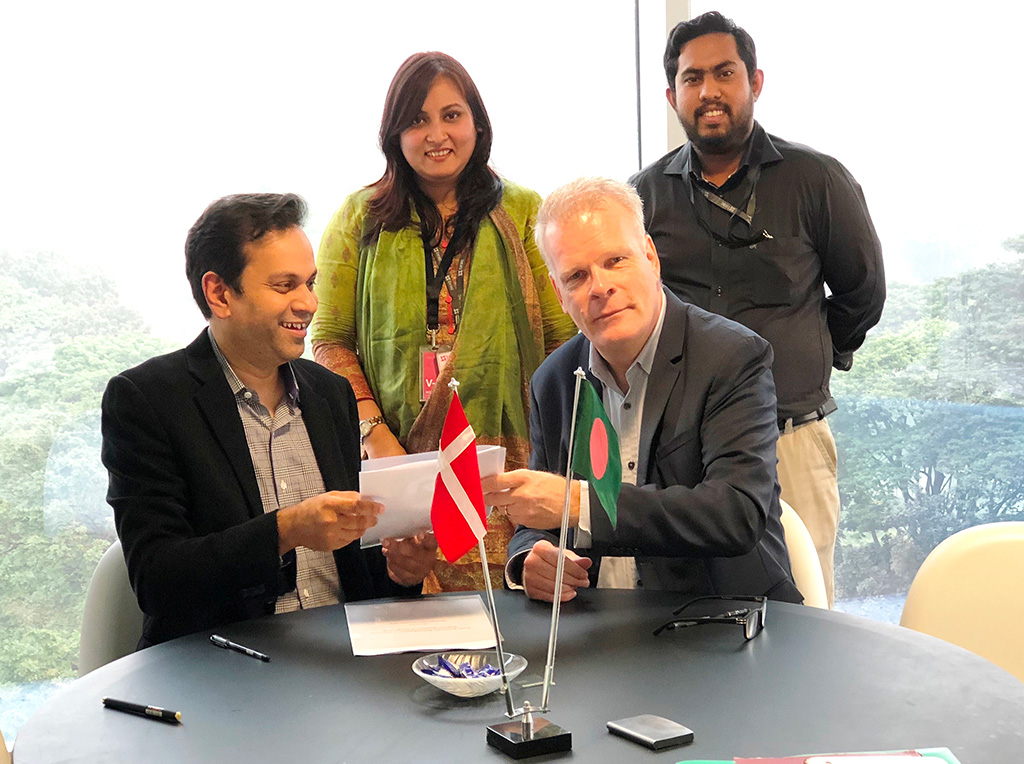
The Ministry of Foreign Affairs of Royal Denmark and BRAC have signed an agreement to implement a 2-year project titled ‘Socio-economic reintegration of returnee migrant workers of Bangladesh’ to facilitate the reintegration process of the expatriate workers who have returned to their home country.
The objective of the project is to raise public awareness about the essential social and economic support our migrant workers need for reintegrating themselves into the mainstream society once they permanently return, facilitate skill training activities increasing their scope for better utilisation of the money they have earned abroad, and carry out advocacy with the government to undertake separate programmes for returnee migrants, focusing on the issue of reintegration.
Ambassador to the Royal Denmark Embassy in Dhaka Mikael Hemniti Winther and BRAC’s senior director for strategy, communication and empowerment Asif Saleh signed the agreement on behalf of the respective parties at a ceremony in Dhaka on 20 December (2017). Other officials of BRAC and the Danish embassy in Dhaka were present at the event.
The two-year long project will end in December 2019.
Ambassadors from European countries visit BRAC in Liberia
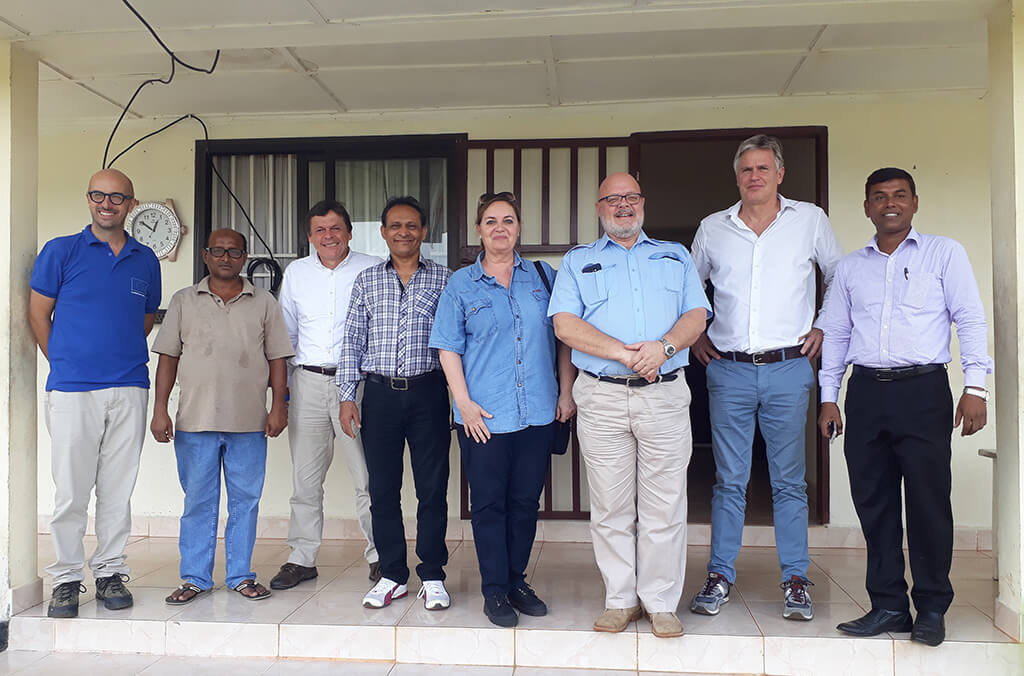
Ambassadors from four European countries visited BRAC’s food security and livelihood programme at Buchanan, Grand Bassa County on 28 November 2017.
The honourable group of ambassadors was Ambassador of European Union, Helene Cave, German Ambassador Hubert J. Jäger, British Ambassador David Belgrove OBE and French Ambassador Terence Wills. Alberto Menghini, Head of Cooperation Section of EU Delegation to Liberia was present along with the team.
The group of ambassadors visited BRAC’s poultry hatchery and feed mill at Neekrin Township, Buchanan. After a brief presentation, they discussed the feasibility, operation, business model and future plan. The hatchery and feed mill started operation in 2014 with support from Chevron and European Union. Since then it has successfully produced day old chicks and feeds for chicken. The team also visited a community-level farmer training session to see how communities are engaged with the project across various levels.
The training was organised by the European Union funded PRO ACT project which began in 2016. The main objective of the project is to improve the food and nutrition security situation of vulnerable population groups. This visit can start new collaborations in the development of agriculture and food security in Liberia.
Digital survey to reduce land related disputes
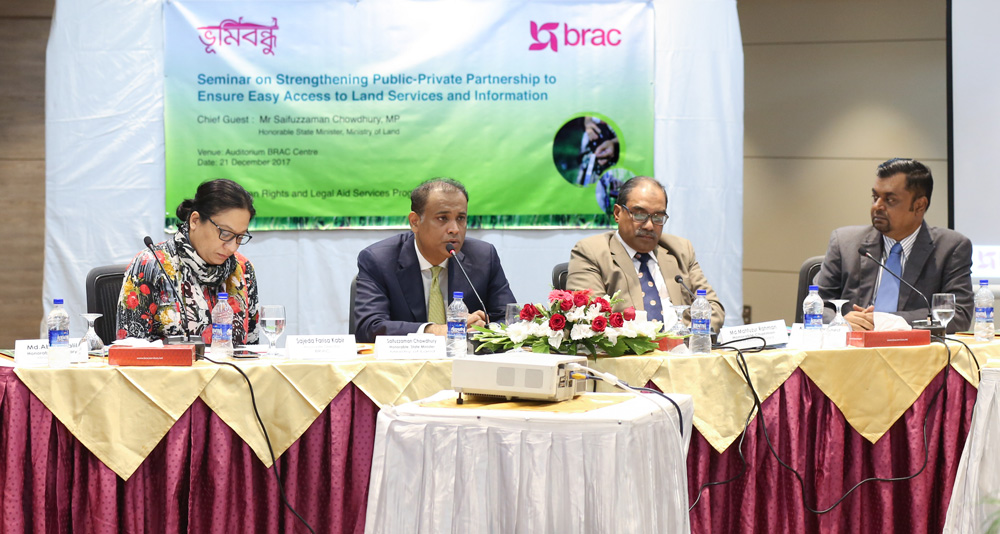
Inadequate implementation of land related laws, lack of information, faulty land surveys and land records are some of the major challenges preventing delivery of proper land related services to the citizens. Along with these problems, lengthy processes followed in service delivery and complications and lack of transparency in financial transaction also perpetuate. As a result, the different initiatives taken up by the government to digitise and modernise the land management system are failing to bring expected benefits to the general people.
Speakers made these observations at a seminar on land services held by BRAC in the capital today on Thursday (21 December 2017). BRAC’s Human Rights and Legal Aid Services (HRLS) programme organised the event titled ‘Strengthening public-private partnership to ensure easy access to land services and information’ at the BRAC Centre at Mohakhali. State minister for land and Member of Parliament Saifuzzaman Chowdhury was present at the seminar as the chief guest.
BRAC’s Advocacy for Social Change programme director KAM Morshed moderated the event, while chairman of Land Reform Board Md Mahfuzur Rahman, director (administration) of Department of Land Record and Survey Matin-ul-Hoque and director (survey) Md Shamsul Alam, and associate director of HRLS Syeda Farisa Kabir spoke, among others.
BRAC Human Rights and Legal Aid Services (HRLS) programme organised the seminar as a part of its effort to facilitate delivery of better quality land services through collaborations between the government and non-governmental agencies.
State minister Saifuzzaman Chowdhury in his chief guest’s speech said, ‘Once we carry out a complete digital land survey it will alone lead to reducing a lot of complications and land cases. That is why we are now giving highest importance on carrying out the digital land survey.’
Having welcomed BRAC’s ‘Bhumibandhu’ initiative he said, ‘Since BRAC works to benefit the marginalised people, I believe that its “Bhumibandhu” will also help the common people establish their just rights on their land property.’ He also suggested that BRAC should create a model of land service delivery by starting work with a single union.
Chairman of Land Reform Board Md Mahfuzur Rahman urged BRAC and other relevant actors about boosting advocacy activities in this sector. ‘To reduce corruption in land service delivery we have to reduce cash transaction,’ he observed, further emphasising the need for laws strengthening Go-NGO collaboration.
Director (administration) of Department of Land Record and Survey Matin-ul-Hoque said, ‘The majority of the land cases derive from conflicts on boundary and attempts to deprive women of their property rights. Most of these conflicts are occurring in the rural areas.’ He stressed digital land survey across the country to resolve the disputes on land boundary.
HRLS programme’s associate director Syeda Farisa Kabir said, ‘The objective of our “Bhumibandhu” is to deliver services with transparency and bring correct information and right advice to the people. We now need assistance from the government to take our effort further.’
The experts came up with a number of recommendations at the seminar that include, among others, bring change in attitude among the land officials, strengthen collaboration with the non-governmental actors, increase the number of staff at the department of land survey, boost public information dissemination activities and prevent corruption and lengthiness in delivery of land services.
The speakers informed the seminar that one in every seven people in Bangladesh endure hassles with their land property. In this context BRAC’s HRLS programme this year (2017) established four centres called ‘Bhumibandhu’ at different corners of the country as part of a pilot project to provide advisory services and other assistance to the public. The centres are located in Pakundia upazila of Kishoreganj, Trishal upazila of Mymensingh, Singra upazila of Natore and Sadar upazila of Panchagarh.
BRAC and German Development Bank sign agreement to set up fund on climate change
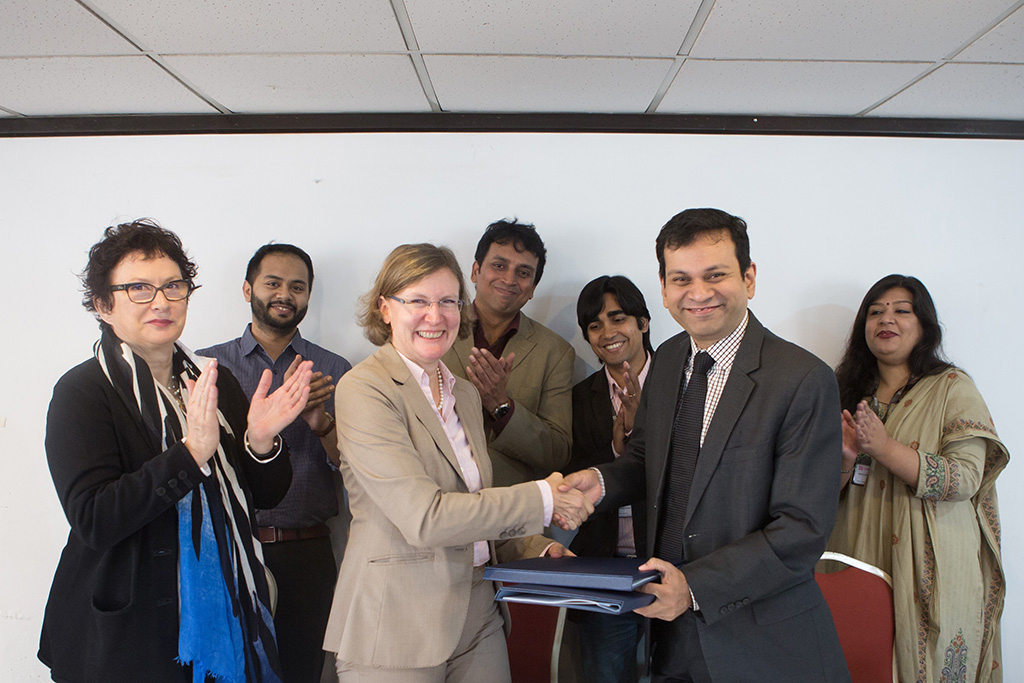
BRAC and the German Development Bank (KfW) on behalf of the German Government signed two agreements to set up a fund on climate change adaptation and climate-induced migration.
The project called ‘Climate bridge fund’ has been drawn through consultation between the two organisations with the objective of supporting the communities of Bangladesh vulnerable to the impacts of climate change.
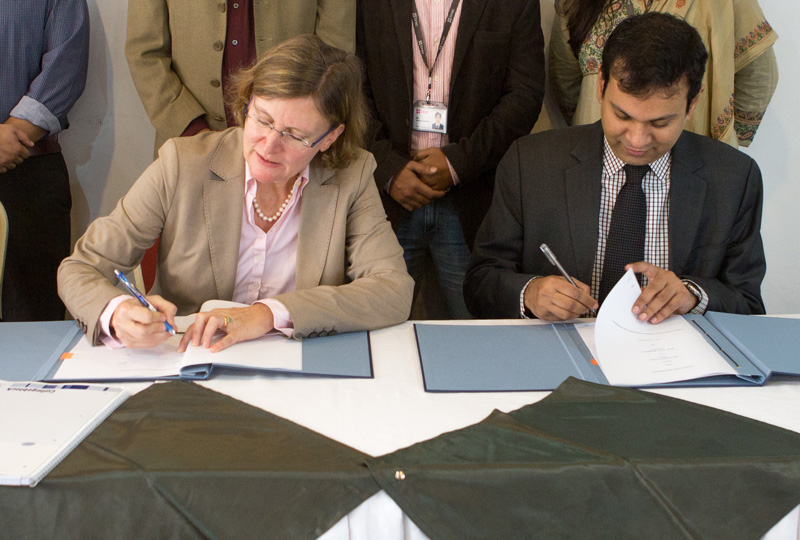
The agreements were signed on Tuesday, December 12, 2017 at the BRAC Centre in the capital. Asif Saleh, senior director, strategy, communication and empowerment, BRAC and BRAC International, Carla Berke, head of division, urbanisation and mobility, South Asia, KfW, Germany, and Regina Maria Schneider, director, KfW regional office, Bangladesh and Nepal, signed the agreement on behalf of the respective parties.
This initiative will provide funding to NGOs, social and private sector institutions to implement projects for strengthening resilience of the vulnerable people in urban areas who are either displaced or at risk of displacement due to climate change impacts. The fund, subject to government approval, will encourage sustainable operations and their scaling up, which traditional development projects usually cannot provide. More details on it will be published during the first quarter of 2018.
Investing in a productive workforce

BRAC in Pakistan organised their the first Annual Performance Awards 2016 to recognise top performing credit officers in the microfinance programme from all the six regions. The awards ceremonies were held in Karachi, Lahore, Multan, Sahiwal, Rawalpindi and Hyderabad, ending in July 2017. The top 36 performers were awarded with cash prizes based on outreach, number of clients, the quality and amount of portfolio achieved, and adherence to BRAC’s core values of integrity, innovation, effectiveness and inclusiveness.
The microfinance programme provides access to the financial support needed for people living in poverty, particularly women, to improve their livelihoods. BRAC uses an inclusive and client-focused intervention to extend financial and non-financial services across a wide number of underdeveloped areas in Pakistan. The loans are delivered at clients’ doorsteps through female agents.
BRAC is currently providing financial assistance to 55,000 borrowers through microloans, small enterprise loan and agriculture loan products. The microfinance programme is operational in 13 districts through 66 branch offices and six regional offices in Sind and Punjab province of Pakistan.
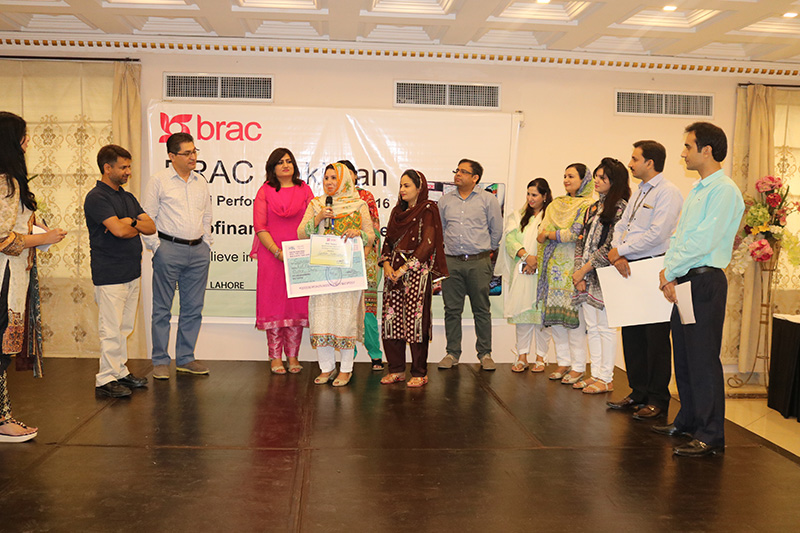
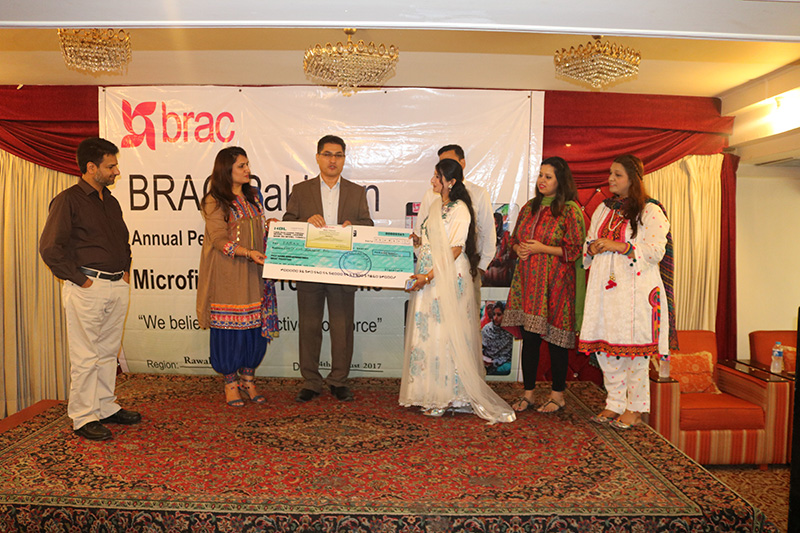
BRAC in Uganda awarded Best Visionary Microfinance Bank 2017
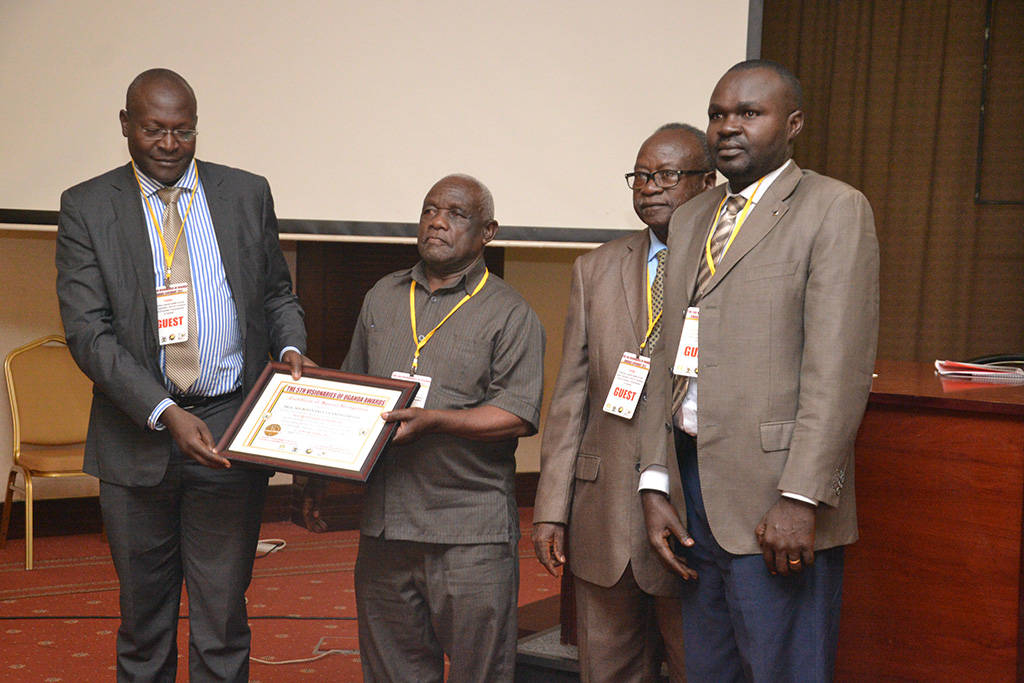
BRAC in Uganda, the country’s largest non-governmental development organisation, has been honoured as the Best Visionary Microfinance Bank 2017. The 5th Visionaries of Uganda Awards ceremony was held at the Kampala Serena Hotel on December 7, 2017.
The award was given to BRAC by the People of the Republic of Uganda for their outstanding contribution towards Uganda’s middle income status aspiration 2020 and Vision 2040, in a ceremony presided over by His Excellency, Edward Ssekandi Kiwanuka, the Vice President of the Republic of Uganda.
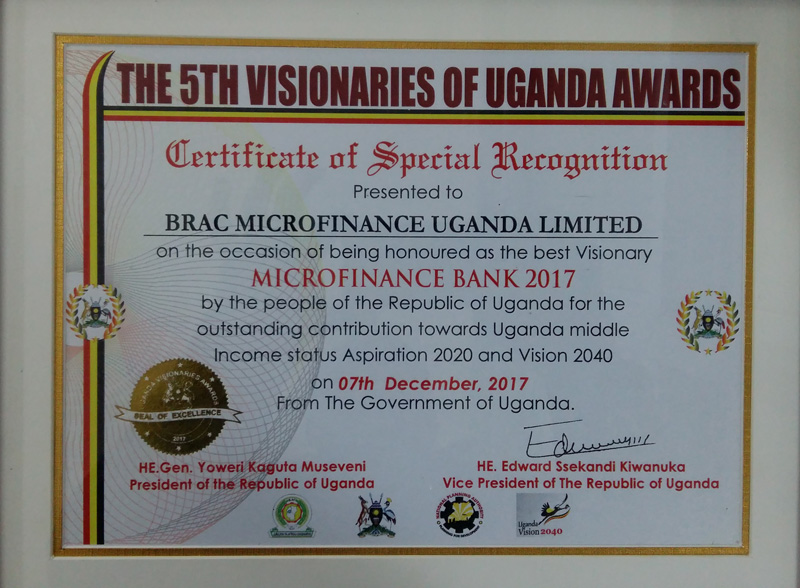
The Visionary of Uganda Awards was launched in 2013 by His Excellency Yoweri Kaguta Museveni, the President of the Republic of Uganda, to award institutions and organisations that contribute towards the social economic transformation of Uganda.
The awards were sponsored by various institutions including the National Planning Authority, Ministry of Agriculture, Mediciens Frontieres and Compuscan CRB Limited. The awards drew over 40 participants including both private and government organisations covering sectors such as health, education, agriculture, microfinance and banking.
BRAC in Uganda provides access to finance and livelihood development services to small entrepreneurs through small enterprise loans. These loans enable them to expand their businesses. These awards are confirmation that alongside growth, BRAC is putting emphasis on providing microfinance solutions to shape and uplift Uganda’s economy.
LANSA-BRAC joint study reveals
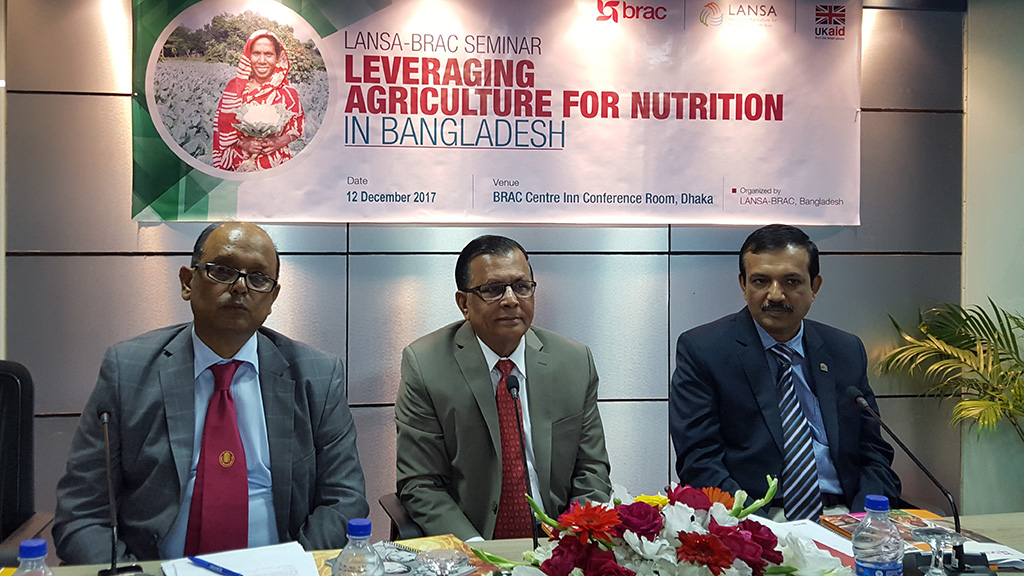
Crop diversification have positive impact on nutritional intake
Crop diversification helps increase the intake of nutritious food by giving households more options in food items to choose from. A study, conducted from 2010-11 to 2014-15, reveals that underweight population among the participant community reduced by 4.5 per cent over this period.
The findings further show that over the study period normal weight population among the participating households increased by 2.3 per cent. Also underweight male population reduced by 4.4 per cent, while female population of the same category reduced by 5.3 per cent.
‘Econometric analysis revealed that crop diversity level has direct influence on dietary diversity and, thereby, on the nutritional status of the individual,’ the study concludes.
International research body Leveraging Agriculture for Nutrition in South Asia (LANSA) and development organisation BRAC conducted the study titled ‘Crop diversity, dietary diversity and nutritional outcome in rural Bangladesh: Evidence from panel households’ with 500 participating households in 12 villages of 11 districts across the country.
LANSA-BRAC consultant Dr Uttam Kumar Deb and BRAC’s Research and Evaluation Division (RED) director Professor Abdul Bayes led the study.
The findings of the study were presented at a seminar styled ‘Leveraging agriculture for nutrition in Bangladesh’ today on Tuesday (12 December 2017) at the BRAC Centre in the Dhaka city. The event was supported by UK AID.
Agriculture secretary Md Kaykobad Hossain was present at the seminar as the chief guest, while Professor Abdul Bayes moderated. BRAC Agriculture and Food Security Programme’s head Dr Md Sirajul Islam, International Food Policy Research Institute (IFPRI) research analyst Tauseef Salahuddin, and RED senior research fellow Barnali Chakraborty presented three other papers at the event. Agriculture joint secretary Balai Krishna Hazra and WorldFish country director Dr Malcolm Dickson, among others, also spoke at the seminar.
Md Kaykobad Hossain said, ‘It is difficult for Bangladesh to mitigate the challenges including that of increasing the nutritional intake for the 160 million people with limited resources. As a part of its efforts, the government is giving emphasis on distribution of nutritious food items besides rice under its VGD (Vulnerable group development) programme.’
‘Rice cannot fulfil our daily need of food intake. So the government is now motivating the farmers to produce new crop varieties apart from rice,’ he further said.
‘Besides food crop production, we have to increase our focus on building quality storage system,’ added the agriculture secretary.
Professor Abdul Bayes said, ‘It is true that Bangladesh has made better progress in increasing people’s nutritional intake than some of the disadvantaged African nations, but to make further progress our farmers need to reduce their dependence on rice cultivation.’
Professor Bayes in his presentation pointed out that during the study period, 99 per cent of the farmland was under rice cultivation throughout the monsoon, which changed outside the rainy season to bring more than 45 per cent of farmland under non-rice crops.
The community in the study area, however, generally manifested a positive trend towards cultivating varieties of crops. Households with larger farms and comparatively better institutional education showed more interest about crop diversification.
The speakers also warned that an upward trend of gaining weight in a section of the community is also evident from the study. During the study period, overweight population increased in the participant households by 1.9 per cent with overweight male population increased from 3.9 per cent to 5.6 per cent and female population increased from 9.3 per cent to 11.3 per cent. During the same period, obese population increased from 0.9 per cent to 1.2 per cent with obese male population increased by 0.5 per cent and female population increased from 1.3 per cent to 2 per cent.
Summaries from three more research work were also presented at the seminar. Dr Md Sirajul Islam presented the paper titled ‘A study on milk value chain for the poor in Bangladesh’. Barnali Chakraborty’s paper was titled ‘A capability approach to child nutrition: Parents’ stories in context of haor’, while Tauseef Salahuddin presented a paper styled ‘Dietary patterns in rural Bangladesh: What influence of agriculture?’
Join the world’s biggest family

